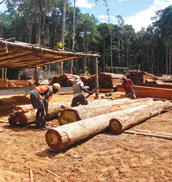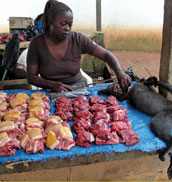 |
Sustaining Cameroon’s forests
There was a time when logging companies in Cameroon plundered the
forest—all eyes on profit rather than the future. Forestry reforms
introduced by the government over the past decade sought to change this, and
companies must now draw up management plans for sustainable harvesting.
However, CIFOR research has revealed flaws in a key law governing forest
management. Painstaking data crunching has convinced the government that it
is time to revise the law. more |
 |
Logging for biodiversity
Industrial timber production can have disastrous effects on biodiversity.
However, it doesn’t need to be like that. When sensitively and sustainably
managed, production forests can yield a profit for timber companies without
destroying biodiversity. The International Tropical Timber Organization’s (ITTO)
new biodiversity guidelines show how it can be done. CIFOR scientists helped
to formulate and shape the guidelines. more |
 |
Reforming the bushmeat trade
Hunting for food threatens the survival of many tropical forest species.
But blanket bans against hunting could make life worse, not better, both for
wildlife and for millions of people who depend on bushmeat for their
survival. Instead, local people should be given the rights and
responsibility to hunt the more resilient species at sustainable levels.
This is a key recommendation of Conservation and use of wildlife-based
resources: the bushmeat crisis, published by the Convention on Biological
Diversity (CBD). CIFOR scientists contributed to the research and writing of
the report. more
|